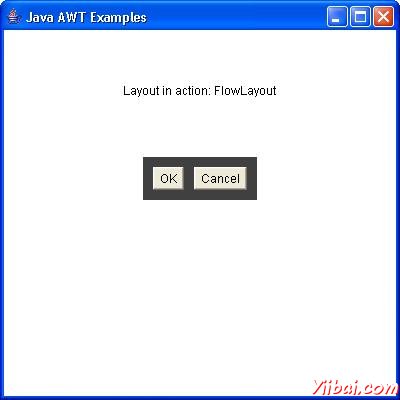AWT FlowLayout
介紹
FlowLayout類組件排列爲左到右的流動。
類的聲明
以下是聲明的java.awt.FlowLayout類:
public class FlowLayout extends Object implements LayoutManager, Serializable
字段域
下面的java.awt.BorderLayout類的字段:
static int CENTER -- 該值指示每一行組件都應該爲中心。
static int LEADING -- 此值指示每一行組件都應該是合理的容器的方向的前緣,例如,在左到右的方向的左側。
static int LEFT -- 此值表示每行組件都應該是左對齊。
static int RIGHT -- 此值表示每行組件都應該是右對齊。
static int TRAILING -- 此值指示每一行組件都應該是合理的容器的方向的後邊緣,例如,在左到右的方向的右側。
類的構造函數
S.N.
構造函數與說明
1
FlowLayout()
Constructs a new FlowLayout with a centered alignment and a default 5-unit horizontal and vertical gap.
2
FlowLayout(int align)
Constructs a new FlowLayout with the specified alignment and a default 5-unit horizontal and vertical gap.
3
FlowLayout(int align, int hgap, int vgap)
Creates a new flow layout manager with the indicated alignment and the indicated horizontal and vertical gaps.
類方法
S.N.
方法和說明
1
void addLayoutComponent(String name, Component comp)
Adds the specified component to the layout.
2
int getAlignment()
Gets the alignment for this layout.
3
int getHgap()
Gets the horizontal gap between components.
4
int getVgap()
Gets the vertical gap between components.
5
void layoutContainer(Container target)
Lays out the container.
6
Dimension minimumLayoutSize(Container target)
Returns the minimum dimensions needed to layout the visible components contained in the specified target container.
7
Dimension preferredLayoutSize(Container target)
Returns the preferred dimensions for this layout given the visible components in the specified target container.
8
void removeLayoutComponent(Component comp)
Removes the specified component from the layout.
9
void setAlignment(int align)
Sets the alignment for this layout.
10
void setHgap(int hgap)
Sets the horizontal gap between components.
11
void setVgap(int vgap)
Sets the vertical gap between components.
12
String toString()
Returns a string representation of this FlowLayout object and its values.
繼承的方法
這個類繼承的方法從以下類:
- java.lang.Object
FlowLayout 實例
選擇使用任何編輯器創建以下java程序D:/ > AWT > com > yiibai > gui >
AwtLayoutDemo
package com.yiibai.gui; import java.awt.*; import java.awt.event.*; public class AwtLayoutDemo { private Frame mainFrame; private Label headerLabel; private Label statusLabel; private Panel controlPanel; private Label msglabel; public AwtLayoutDemo(){ prepareGUI(); } public static void main(String[] args){ AwtLayoutDemo awtLayoutDemo = new AwtLayoutDemo(); awtLayoutDemo.showFlowLayoutDemo(); } private void prepareGUI(){ mainFrame = new Frame("Java AWT Examples"); mainFrame.setSize(400,400); mainFrame.setLayout(new GridLayout(3, 1)); mainFrame.addWindowListener(new WindowAdapter() { public void windowClosing(WindowEvent windowEvent){ System.exit(0); } }); headerLabel = new Label(); headerLabel.setAlignment(Label.CENTER); statusLabel = new Label(); statusLabel.setAlignment(Label.CENTER); statusLabel.setSize(350,100); msglabel = new Label(); msglabel.setAlignment(Label.CENTER); msglabel.setText("Welcome to TutorialsPoint AWT Tutorial."); controlPanel = new Panel(); controlPanel.setLayout(new FlowLayout()); mainFrame.add(headerLabel); mainFrame.add(controlPanel); mainFrame.add(statusLabel); mainFrame.setVisible(true); } private void showFlowLayoutDemo(){ headerLabel.setText("Layout in action: FlowLayout"); Panel panel = new Panel(); panel.setBackground(Color.darkGray); panel.setSize(200,200); FlowLayout layout = new FlowLayout(); layout.setHgap(10); layout.setVgap(10); panel.setLayout(layout); panel.add(new Button("OK")); panel.add(new Button("Cancel")); controlPanel.add(panel); mainFrame.setVisible(true); } }
編譯程序,使用命令提示符。進入到D:/> AWT,然後鍵入以下命令。
D:AWT>javac comyiibaiguiAwtlayoutDemo.java
如果沒有錯誤出現,這意味着編譯成功。使用下面的命令來運行程序。
D:AWT>java com.yiibai.gui.AwtlayoutDemo
驗證下面的輸出
